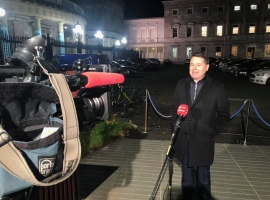
The Irish economy is continuing to grow rapidly through a period of great uncertainty. This growth is also clearly benefitting households. This is according to Ibec's third quarter Quarterly Economic Outlook, which forecasts GDP growth of 4% in 2019.
The report shows that the Irish economy is now close to full employment, with moderate inflation and the strongest increases in real living standards since the late 1990s. This growth dividend has increased real, after-tax, household income in the economy by one-quarter in just five years. This has been matched by no other economy in the developed world.
For 2020, Ibec forecasts that growth will moderate to 2.7% as both the Irish and global economies reach a mature stage of the business cycle. This is assuming a deal on Brexit is reached. In the event of a no-deal Brexit, Ibec expect significant impacts from continued depreciation in the value of sterling, cancelled investment, falling consumer confidence, rising costs and significant trade disruption.
The economy may still grow, but growth would more than halve in 2020 and employment growth could fall below 0.5%. Ibec has called for October’s budget to include new and far-reaching state aid supports to assist vulnerable companies.
According to Ibec, last year was the first year where the value of Irish indigenous exports fell since 2011. This trend has been reversed in the early months of 2019 driven by continued increases in production in both the alcohol and dairy sectors. Both sectors will face challenges over the coming year due to US tariffs and Brexit.
Ibec analysis has shown that Irish goods are the most exposed, on a per capita basis, to the proposed US tariffs on EU goods. Irish exports worth €818 million could be hit by new tariffs.
Commenting on the report, Ibec Chief Economist, Gerard Brady said, “Even in the event of a Brexit breakthrough, there are reasons to believe that growth will slow over the coming years. The global trading environment is becoming more difficult for small open economies due to rising trade tensions. The global economy is also close to the top of the business cycle.”
He added, “These factors are now cutting through to the real economy in Europe. BusinessEurope analysis shows that that our fellow business associations in twenty-four of the twenty-seven other EU member states expect a slowdown in growth in 2020 relative to 2019.”
Source: www.businessworld.ie
















